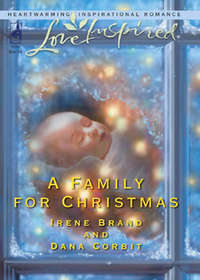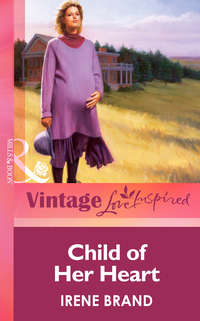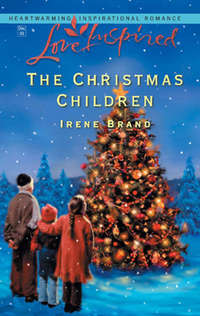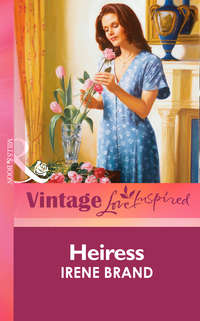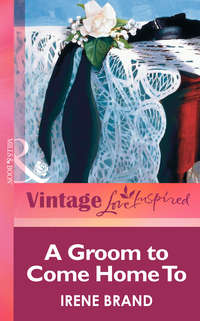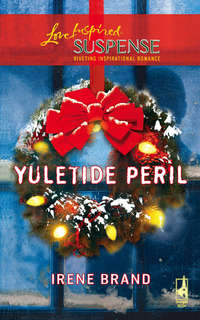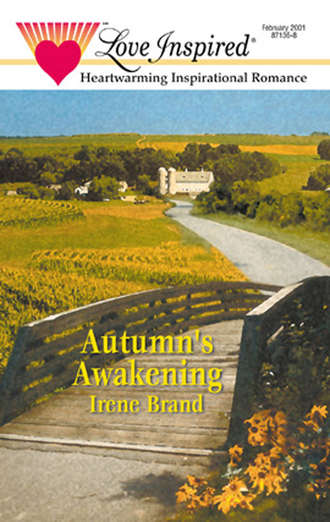
Полная версия
Autumn's Awakening
“You’re looking decidedly cheerful for a woman who drove five hundred miles yesterday and spent most of the night out on a vet call,” Trina observed.
Olive laughed, Autumn blushed and Trina stared suspiciously at her friend.
Heading for the stairs, Autumn said, “I’ll be down soon. Do we have a full schedule today?”
“Only a few calls so far. Ray’s usual procedure is to open the clinic for surgery at eight o’clock,” Olive explained, “and go on field calls in the afternoon. Since there are two of you, it should work out well for one of you to be at the clinic all the time. We have lots of emergency walk-in customers. Ray is the only vet in the area, so he’s always busy.”
“Suits us,” Trina said. “We need to put our education to practical use.”
When Autumn got back to her room after showering, Trina was struggling up the stairs with two suitcases.
“I’ll help with that,” Autumn said, “as soon as I dress.”
“Take your time. Dolly is helping Miss Olive with the dishes.” Trina brought a bag into Autumn’s room. She admired an antique barrel-top train trunk that stood in front of the window, then sat on the side of Autumn’s bed.
“You look happier than I’ve seen you since the day Spring and Bert were married. What’s happened?”
Pulling a sweatshirt over her head, Autumn grinned. “Old eagle eye! Am I that transparent?” Her pulse quickened when she said happily, “My early-morning call was to the farm of Nathan Holland. His uncle died and Nathan inherited the property that adjoins Daddy’s farm.”
“No wonder you’re radiant! Don’t tell me you’ve already patched up the differences of the past.”
Autumn shook her head. “We’re a long way from that, for we can’t span eight years in a few hours. He did ask me to have breakfast with him, so I suppose that’s a step in the right direction.”
“Apparently that torch you’ve carried for him is still burning brightly?”
“I don’t know how bright it is, but there’s still a flicker left. It’s ridiculous, with all that’s behind me and the future I have as a veterinarian, that I can’t forget a girlish infatuation.”
“Are you sure it was only an infatuation?”
“I don’t know, but I suppose two months will give me time to find out.” Autumn finished tying her shoes. “Let’s go to work.”
Nathan jammed his hands deep in his pockets as Autumn drove away from Woodbeck Farm. He returned to the kitchen, filled the dishwasher, unlocked a drawer in his desk and took out a large envelope. Sitting at the table, he drew out a photograph that he’d mistakenly taken away from Indian Creek Farm the day Landon had fired him. As he’d angrily scooped up his possessions and loaded them into boxes, he didn’t realize he’d gotten a file folder that belonged to the Weavers.
After he arrived at the oil camp in the Middle East, he started studying the textbooks and notes he’d used at OSU, where he had studied for one semester. Among his papers, he’d discovered a folder containing several newspaper clippings of Weaver triumphs at various fairs and farm shows. Triumphs that had made the Weaver girls famous throughout the Midwest. Their names commemorating the seasons of the year had been noteworthy, but from the time they were able to walk, dressed alike in prairie dresses and sunbonnets, they’d perched on the wagon beside their father as his six-hitch draft horses won numerous trophies in parades and fairs in Ohio and neighboring states.
The enclosure that ruined what little peace of mind Nathan had mustered since the episode with Landon was a large photo of Autumn, dressed in a long, blue dress, wearing a matching sunbonnet, standing beside a Belgian mare. Nathan was angry that her image had followed him halfway around the world, and he started to destroy the picture, but he didn’t have the courage. Posting her picture over his bunk, he learned to live with Autumn’s presence, thinking he would never see her again.
“God,” he moaned, “why did she have to come back? I’ve ordered my life without her and am finally making something of myself. The things that matter the most haven’t changed. I’m still a struggling farmer born on the wrong side of the tracks. She’s Autumn Weaver, member of a socially prominent family and possible heir to great riches. Why did she have to return?”
But had he ordered his life without her? Determined to wipe Autumn’s memory from his mind, Nathan had dated several women, but none of them snagged his interest. Nathan thought Autumn was the most beautiful girl he’d ever seen, and all other women paled into insignificance when he compared them to Autumn when she was eighteen. She’d been tall, willowy, regal. Curly chestnut hair framed her oval face like a halo, and her animated sky-blue eyes nestled in a smooth, creamy complexion, soft as a rose petal. She was even more fascinating now. Nathan shook his head to clear away the memories and locked the picture back in his desk.
He went to the barn and took the still-sleeping Tony by the arm. “Wake up, Tony. Your mother told me to bring you home early. You have a dental appointment this morning.”
“Aw, gee,” Tony said, shaking himself awake. “I wanted to stay here.”
“Your mother can drop you off on the way back from the dentist, and you can finish painting the fence around the paddock. I’ll be out in the fields, and if Dr. Weaver leaves any medicine, put it in that refrigerator here in the barn.”
After the short trip to the Simpson farm and back, Nathan got on his tractor and headed toward the fields to cut alfalfa, hoping to avoid another encounter with Autumn until he stifled his emotions, but that was a mistake. One of his most memorable incidents with Autumn had occurred when he was cutting hay.
The summer day she’d returned home from college was seared in his memory. He’d been in the alfalfa field driving a team of Belgians hitched to a mower, when he’d seen her hurrying along the path to the pasture. She’d stopped when she reached the mower, and her eyes had brightened when he tipped back his hat so she could see his face. He’d heard about her homecoming, and he wondered if he’d see her. His pulse was racing, for he didn’t suppose she would even remember him.
Her eyes had brightened. “Nathan?” she cried delightedly.
He’d grinned and stepped to the ground beside her.
“I didn’t know you were working for Daddy.”
“After Christmas I came back to Ohio and asked your dad for a job. He hired me the first of the year to take care of his young stock. I live in that little apartment over the tack room.”
“Oh, I’m so glad. I remember you said you’d like to raise Belgians.”
His dark face flushed, and embarrassed, he’d said, “That’s only a dream. I don’t suppose I’ll ever reach it.”
“You’re at the right place to learn the trade. If anyone can teach you about draft horses, it’s Daddy. I’m pleased to see you, Nathan. I’ve thought about you often this winter. I was never so happy to see anyone as I was when you showed up in the barn last Christmas Eve.”
Surprised at her candor, Nathan had felt his face flushing. “I didn’t do anything. You were the expert.”
“But you were there! If you hadn’t encouraged me, I might not have saved the foal.”
They’d been standing on a high point providing an overview of the farm. Autumn had looked around in delight as she surveyed the four hundred acres of flat fields and slightly rolling hills bisected by Indian Creek and bounded with white board fences. She’d pulled off her sandals and run circles in the dark-green alfalfa hay while a slight breeze stirred her curly hair.
“Glad to be home, are you?” Nathan had said, grinning at her exuberance.
“Oh, yes! I’m going to the pasture to see Noel. How is she?”
“Looks like a fine filly to me. Bet you can’t pick her out of the other foals.”
“Of course I can! I’ve had her picture on my desk since Christmas. How much do you want to bet?”
“Just kidding!”
“No. I mean it. If I can pick Noel out of all the other foals, you buy me dinner. If I can’t, I’ll pay.”
He shook his head. “I’m not betting.”
“I’ve got to hurry. Mother insists that I be back in time for dinner. Can you go with me to the pasture?”
When he’d heard that Autumn was coming home for the summer, Nathan had made up his mind to avoid this girl who’d dominated his thoughts for months. Now that he’d seen her again, his good resolutions had dwindled. It was one thing to say he’d have nothing to do with Autumn when she was in Massachusetts. But seeing her in the flesh, her windblown red hair framing a smiling face, her luminous blue eyes smiling at him, all of his resolutions had disappeared as if he’d never made them.
Knowing it wasn’t wise, Nathan had unhitched the reins and tied the horses to the fence, so they wouldn’t stray while he was gone. “I only have another hour’s work, so I can spare a few minutes.”
“What else have you been doing since I saw you?” Autumn asked as they walked side by side.
“I’ve been taking night classes at OSU’s agricultural college, where I’ve learned you need a lot of head knowledge, as well as experience and money to become a farmer. Uncle Matthew is helping me.”
Nathan’s father, a half brother of Matthew Holland, had never been a good provider, and Nathan had grown up in poverty. His father resented Matthew’s affluence and distanced himself from his brother, but after the death of Nathan’s father, Matthew had helped his sister-in-law and her three boys.
“So, you still think you’d like to be a farmer? That episode at Christmas didn’t discourage you?”
Nathan had shaken his head, but didn’t answer. He couldn’t think dispassionately about anything that had happened at their first meeting.
When they’d reached the pasture, Autumn clapped her hands when she saw the ten red foals grazing. “Aren’t they beautiful?”
“I think so.” Nathan had unlatched the fence, and ten sorrel heads lifted expectantly. Nathan took a halter from a fence post, and they entered the pasture and walked slowly toward the young animals, whose legs seemed much too long in proportion to their graceful slender bodies. Their chestnut coats gleamed like burnished copper, and a breeze ruffled the white manes.
“They’re used to me,” Nathan had said, “so I can usually catch them. They’ve only been weaned for a few weeks, but I’ve been breaking them to the halter all winter. Pick out Noel, and I’ll put a halter on her.”
Autumn walked slowly among the foals and looked at all of them carefully before she stopped in front of one and ran her hand over the white strip on its face. “That’s Noel,” she said, and Nathan grinned, walked to the filly and put the halter around her neck.
“How did you know?”
“Instinct, maybe. Remember I’ve grown up with Belgian colts, but mostly, because I found that red star in the middle of her forehead. That’s the clue I looked for.”
Noel had tossed her head, but she’d quieted when Autumn’s hands caressed her neck and shoulders. “Oh, she’s wonderful. Do you think I have time to train her for showing at the state fair in August?”
“I don’t have a clue, but your dad will know.”
“But I’m not sure he’ll agree to let me show Noel. He might, if Mother doesn’t interfere.” Autumn had given the filly another hug when they left the pasture.
Before they parted in the hay field, Autumn had said, “Don’t forget, you lost the bet.”
Wanting desperately to have a date with her, he’d shaken his head. “I’m sorry, Autumn. I think your father is pleased with my work at Indian Creek Farm, but he wouldn’t approve if I took you out for dinner. A few months ago, one of the workers invited your sister to go to a church meeting, and Mr. Weaver fired him immediately.”
“I’m old enough to choose my own friends. I like you.”
Nathan’s heart had leaped at her words, but trying to control the tremor in his voice, he said patiently, “You don’t understand. Just because you and I met under unusual circumstances doesn’t mean we can be friends.”
“We will, if I have anything to say about it.”
“Give me a break, Autumn. I need this job. I want to work here, so don’t get me in trouble with the boss.”
When he stepped back on the mower, she’d said, “I can handle Daddy.”
Famous last words! Nathan thought as he remembered what had happened on the day Landon Weaver had fired him.
Chapter Four
The clinic resembled most medical doctors’ offices. A small waiting room contained several chairs, and magazine racks were filled with periodicals for adults as well as magazines to interest children. A small wooden desk provided a place for Miss Olive to serve as Ray’s receptionist.
The office contained modern computer equipment with Ray’s accounts entered into the system. The records were up-to-date, and Trina and Autumn had little trouble understanding how he operated his clinic. Two surgery rooms, an X-ray room, a half-dozen cages and several runways provided good facilities.
The morning passed quickly as they pumped the stomach of a cat that had helped itself to a pizza laced with hot peppers, gave several dogs a series of shots, and treated a large brown rabbit for ear mites.
Dolly had been an interested bystander in the surgery rooms, but with her first question, Trina said sternly, “You may watch as long as you stay out of our way and keep quiet. Get up on that stool and stop talking.”
“And I thought going to vet school was hard,” Trina complained when they went into the kitchen for the hot lunch Olive had prepared.
“Welcome to the real world, Trina,” Autumn said as she sat down. “I followed Ray around long enough when I was a kid to know that a vet doesn’t have an easy job, but I can’t think of anything I’d rather be doing.”
Dolly was placing plates and cutlery on the table. “Can I ask questions now, Aunt Trina?” she asked.
Trina laughed. “I suppose so. I’m sorry I was cross with you, but I was nervous because it was our first day on the job. I didn’t want to make any mistakes.”
“Oh, that’s all right. Why do cats and dogs need shots? You treated those animals just like they were real people, taking X-rays and stuff.”
“Animals need shots to make them well, or keep them healthy, the same as you do,” Trina said. “I won’t tell you all the names, for you wouldn’t remember them anyway, but animals can have the same kind of diseases humans do—viruses, hepatitis, heart trouble, Lyme disease and lots of other things.”
“Gee!” Dolly said, her expressive gray eyes sparkling.
“I noticed Ray has kept up with the latest in medical equipment,” Autumn said to Olive. “He has everything our professors recommended that we should buy when we started out on our own.”
Pleased, Olive said, “He’s always interested in the latest cures and supplies. The reason he took this long tour is to study diseases and medical procedures in other countries. But he has more work than he can handle.” Looking keenly at Autumn, she said, “He needs another vet, so he won’t have to be on call all the time. Why don’t you and Trina stay on when he gets back? Ray would like to semiretire, and all of you could make a good living here.”
Olive had always fussed like a mother hen over her bachelor brother, and Autumn figured this idea of semiretirement was more her idea than Ray’s. Still, if problems of the past could be erased, it would be nice to settle down in Greensboro, especially now that Nathan was living in the county.
But would she be able to receive Nathan’s forgiveness and win his love? Did she even want his love now? Was that a pipe dream of the past? Would her parents forgive her and welcome her into the family circle again? Until she knew the answer to those questions, Autumn wasn’t making any promises.
“Thanks, Miss Olive,” Trina said, “but I’m engaged to a great guy who has a few more months of veterinarian training. When he’s licensed, we plan to take over his father’s practice in St. Louis. It sounds like a good opportunity for Autumn, though,” Trina said with a meaningful glance at her friend.
“We’ll wait and see how these two months turn out.”
Slumping in her chair to rest a bit, Autumn jumped when frantic pounding sounded at the back door.
“Help! Help!” a youthful voice yelled.
Autumn rushed out on the porch.
A teenage boy stood on the back step. Tears glistened in his eyes and he swiped them away.
“Flossie’s got a broken leg. She’s in the truck.”
Autumn opened the screen door, calling, “Come to the clinic when you can, Trina.” The boy ran down the sidewalk, and Autumn’s long-legged stride kept up with him.
A girl, younger than the boy, sat in the back of a pickup holding a bleating goat in her arms.
Autumn took the struggling goat from the girl, who jumped out of the truck and ran beside Autumn. The boy sprinted ahead to open the door, and Autumn carried the animal inside the clinic. The goat’s left foreleg dangled helplessly.
“What happened?” Autumn asked.
“A mean ole’ dog jumped on her,” the little girl said, her lips quivering.
“Don’t worry,” Autumn said. “Flossie will be as good as new in a few weeks.”
Trina, with Dolly tagging at her heels, came into the surgery and prepared to tranquilize the goat. The three children crowded close to the operating table.
“Hey! We can’t have this,” Trina said. “Dolly, you go back in the house.”
A hefty woman, who’d been driving the pickup, came into the waiting room. Without saying a word, she gestured to her children and they scuttled out of the surgery. With another quick look at the goat, Dolly ran out too, and Trina closed the door.
While Autumn scrubbed her hands and arms, Trina put a mask over Flossie’s nose and slowly sedated her until she was as limp as a rag. Autumn carried her to the X-ray room to determine the extent of the break. Fortunately, the bone hadn’t punctured the skin, so Autumn straightened the leg and encased it in a Thomas splint. The goat was still sedated when she called the family in. The little girl patted the goat’s head.
“Flossie, you’ll be all right,” she crooned.
The woman followed her children and held out her hand to Autumn. “I’m Sandy Simpson, and my kids are Tony and Debbie. Welcome to Greensboro.”
“Tony, you look familiar,” Autumn said.
“I work for Mr. Holland. I saw you at his farm last night.”
“Oh, yes. I didn’t get a good look at you in the darkness.” She turned back to Sandy. “Thanks for the welcome, but actually, I’m a native of this area. I’m Autumn Weaver. This is my associate, Trina Jackson.”
“Weaver, as in Weavers of Indian Creek Farm?” Sandy asked, amazement mirrored on her round face.
“Yes, but I’ve been gone for several years,” Autumn said evenly. No doubt she’d be answering that question often in the next two months.
“Stop by our farm for a visit when you’re out that way,” Sandy said. “We live a few miles north of Woodbeck Farm. We run a few cattle, but our major interest is horses. We have three Thoroughbreds now, but we don’t intend to buy any more until we see how we make out with them.”
Sandy wrote a check for their services.
“In case there might be complications,” Autumn explained, “I’d like to see Flossie again tomorrow morning. The splint will need to stay on a few weeks, but check a couple of times each day above the splint for swelling or dampness. Also, feel the foot to make sure it’s warm, which is an indication of normal circulation.”
“Can Flossie walk now?” the boy questioned.
“Sure,” Trina said.
Still a bit woozy, Flossie staggered when Autumn set her on the floor, but she wobbled out of the building to the delight of her happy family.
A bemused expression on her face, Autumn said, “That’s the reason I wanted to become a vet. I like to bring happiness to people, especially children.”
“But we can’t heal all their pets, and that’s going to hurt,” Trina replied.
Leaving Trina to handle the office work, Autumn made calls to two dairy farms where some cows were in the early stages of grass tetany, but the cases weren’t as severe as Nathan’s cow had been. By late afternoon, as she turned into the driveway of Woodbeck Farm, every nerve in her body was twanging at the thought of seeing Nathan again.
Nathan’s home, a pre-Civil War structure named Woodbeck after the Holland family’s ancestral home in England, had been completely renovated during the lifetime of his grandfather. The brick walls had been painted white and modern accommodations added several years ago. At one time, it had rivaled the Weaver farmhouse for beauty, a fact that Clara refused to acknowledge. Since Matt Holland had been a bachelor, he hadn’t kept the house nor grounds in tiptop shape, but the two-story building with huge chimneys at each end and a comfortable front veranda the width of the house was still an architectural masterpiece.
Matt had spared no expense on his red wooden barns and utility buildings, and Nathan had followed his example. Autumn’s heart swelled when she saw the newly painted buildings and the herd of Angus cattle grazing in a nearby pasture. It seemed like a miracle that Nathan’s youthful dreams had been fulfilled.
Tony Simpson sauntered off the back porch.
“Mr. Holland’s gone,” he said. “He said to tell you the cow’s still in the stall. You can check her and leave your bill with me. He’ll mail you a check.”
Autumn felt as if she’d been drenched in a bucket of ice water. Was Nathan avoiding her? she wondered. A red pickup was parked in front of the house so he must be working on the farm. She scanned the fields around the house, but she didn’t see him.
Since their chance meeting last night had been amicable, she’d hoped they could become friends and maybe move from friendship to a more intimate relationship. She didn’t ask the boy where Nathan had gone. The events of the past few years had been humbling, but she still had a touch of the Weaver pride.
“How’s Flossie doing?” she asked to break the silence.
“Okay,” Tony said. “We’ve got her in a pen so she won’t move around too much and hurt herself.”
The cow’s condition was vastly improved, but Autumn gave her another injection of magnesium oxide and handed the bottle to Tony.
“Tell Mr. Holland to give her the rest of this bottle in daily injections. He can turn her out to pasture in a week. The weather forecast is for dry, hot weather over the next few days, so that should eliminate conditions that cause grass tetany. Mr. Holland can telephone if he needs any more help.”
On her way back to Greensboro, Autumn drove by Indian Creek Farm. Fences that had once been snow-white were now a dingy gray. A dozen Belgian mares grazed in a pasture near the road. When Autumn slowed the truck, they lifted their heads, but she couldn’t tell if Noel was among them. The house was partially hidden by the maple trees that were noticeably larger than they had been the last time she’d seen them. Autumn paused at the driveway, wanting desperately to go home, but after several minutes, she continued toward Greensboro.
Not knowing what time Autumn would come to Woodbeck Farm, Nathan had left in early morning to work on the far side of Indian Creek. The ground was too wet for cultivating, so he spent the day repairing fence, a job he detested and normally put off as long as he could. Today, he looked forward to the tedious work as an excuse to be away from the farm buildings when Autumn came.
Nathan had learned to live without Autumn, and he didn’t want her to disrupt his life again. He’d been convinced she would never return to Greensboro, or he wouldn’t have settled here. He could have sold Woodbeck Farm and bought a comparable farm in another location where the memory of Autumn wouldn’t eat at him like a canker. After he took possession of his uncle’s farm, he could never pass Indian Creek Farm without remembering Autumn. On those days, he had often wished he could see her again, believing that the person she’d become after eight years wouldn’t appeal to him at all. Now, he groaned at the thought. In spite of the sadness that marked her expression, the bewitching, impulsive teenager who’d captured his heart had turned into a stunning, enigmatic beauty. To his dismay, he’d learned he was still susceptible to her allure.


